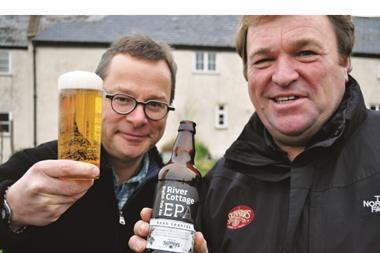Three supermarkets and a supplier condemned by Hugh Fearnley-Whittingstall for dealing in unsustainably farmed king prawns have responded strongly to the charges.
Fearnley-Whittingstall accused supplier CP Foods of using fish meal made from ‘trash fish’ – small, bony fish considered unfit for human consumption – caught in protected Thai waters, and he suggested – though could not prove – that this was being used to feed its prawns.
In last Thursday’s ‘Fish Fight: Save Our Seas’ programme on Channel 4, Fearnley-Whittingstall identified three UK supermarkets, Tesco, Morrison and the Co-op, as CP Foods’ clients. Tesco and Morrisons have announced they will continue to work with existing suppliers towards a sustainable sourcing, while the Co-Op has stated that by the summer it will only sell responsibly sourced fish. Sainsbury’s – though not mentioned in the programme – has also admitted buying prawns from CP Foods, though it insists its suppliers’ prawn farms are all independently certified.
“We stipulate that suppliers ensure all wild-captured species used as fish feed are harvested responsibly from well-managed resources,” said a spokeswoman for The Co-operative Group. “Once the issues with own-brand prawns supplied by CP Foods were identified, we began working with the supplier to rectify matters. Only responsibly sourced fish feed from accredited sources will be used for new supplies due in store this spring/summer.” The group was unable to specify exactly when the change in supply would be made.
Tesco insisted that it was working with other supermarkets to develop sustainable sources of prawns. “We are aware of the concerns relating to the sourcing of fishmeal. It is an industry-wide issue,” Tesco said in a statement. “We’re working with our largest prawn supplier in Thailand on developing trials which limit the use of fishmeal and we have set up a working group on fishmeal involving other major UK supermarkets.”
Morrisons defended the Thai practice of making fishmeal from discarded fish, contrasting it with the EU practice of dumping unwanted catch. “In some South East Asian countries, the fishing industry does not discard unintentionally caught fish. Unlike the EU, which has had a history of discarding unwanted species, everything is landed,” Morrisons said in a statement. “The Thailand fishing industry keeps all of the fish caught, selects fish for customers and then takes seafood to make the fish paste surimi. The remaining fish is then sold to make fishmeal. Because this fish is ‘unwanted’ by other buyers it has attracted the name ‘trash fish’.”
Morrisons accepted that over-fishing had taken place, and insisted that working with existing suppliers towards a solution was better than abandoning them. “Last year we began working alongside our suppliers to engage with the fisheries of our prawn supplying countries. This will ensure that we can improve the local fisheries, improve the welfare of the fishermen and increase the availability of marine proteins,” it said. “We believe that it is better to work with the supply chain to resolve problems than to walk away, causing hardship to the many thousands of people who work in the industry.”
Sainsbury’s has also admitted buying prawns from CP Foods, though it claimed its suppliers’ farms are all independently certified, and that it is working towards ever-higher standards of sustainability and welfare.
“Sainsbury’s only sources farmed prawns from independently certified farms and processing plants in Thailand. We are also working with the Sustainable Fisheries Partnership, International Fishmeal and Fish Oil Organisation, FAO and the Prince’s Charities International Sustainability Unit Marine Programme to help develop programmes of responsible supply of fishmeal to the prawn farming industry,” a company spokeswoman said.
Sainsbury’s also claimed that improving standards of sustainability would take time. “Sainsbury’s has been working with our suppliers, the feed industry, scientists and governments to improve the environmental impacts of these fisheries for four years and we recognise that progress will be slow due to the complex nature of the fisheries,” the spokeswoman added.
CP Foods: We don’t use ‘trash fish’
CP Foods, meanwhile, has denied using fishmeal made from trash fish. Fishmeal is used in the farming of not just prawns, but pigs and chickens, which the company also breeds. But CP Foods has insisted that its fishmeal comes from legitimate sources.
“We would also like to point out that, in Thailand, there are two sources of fishmeal: by-products (or trash fish) from commercial fishing, which accounts for 40% of total Thai fishmeal production; and by-products from the surimi and canning industries, which represents the remaining 60%,” said Bob Miller, CP Foods’ UK managing director. “All CP prawn feed uses only fishmeal from by-products of the surimi and canning industries.”
Thailand is the biggest exporter of prawns to the UK, and CP Foods, a $33bn conglomerate, is one of the world’s biggest poultry producers and one of UK retailers’ largest prawn suppliers. The company’s 2011 accounts recorded that a £12m revenue increase was because “sales of prawns [in its British business] continue to show good growth”.
British consumption of prawns is approaching 50,000 tons a year.


















No comments yet